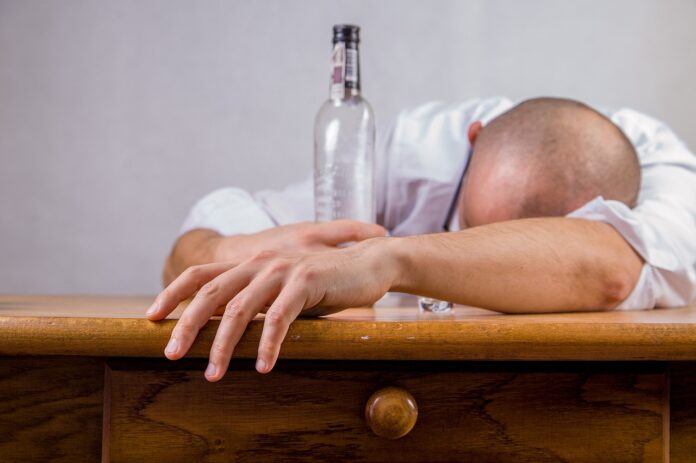As we get closer to Christmas, social festivities are in full swing. From Christmas parties, to work do’s, visiting the markets and much more, Brits have packed diaries, which has prompted them to search for “hangover cures” 14,800 per month on average since August.
Prioritising mental and physical wellbeing, experts at Chill Tubs have worked closely with Dr Deborah Lee, from Dr Fox Online Pharmacy to debunk any myths when it comes to hangover cures, and in turn promote a self-care festive season.
Core myths debunked include, sticking to one type of alcohol to limit hangover effects, whether taking a painkiller before going to bed works, what ‘hair of the dog’ actually does to you, if sports drinks and fry ups have any effect and which hangover cures can be effective. See the medical advice below:
1. Alcohol helps you sleep
This is not true. Although alcohol can help you fall asleep more quickly, your normal sleep pattern is disturbed and you wake more frequently during the night. You also have less REM sleep, which is the most restorative sleep, and wake feeling groggy and unrefreshed in the morning.
2. Sticking to one type of alcohol only prevents a hangover
It’s true that dark drinks such as red wine, brandy, and rum contain more congeners. These are byproducts made during the alcohol distillation and fermentation process. However, a hangover is not just due to congeners. The hangover is due to the toxic effects of whatever alcohol you have had. One of the main issues is dehydration. Whatever you drink, the key is to drink lots of water. Space out your drinks and have a large glass of water between each one.
3. Taking a painkiller before you go to bed can prevent a hangover the next morning
This is not going to help. Ibuprofen will peak in the bloodstream about 2 hours after taking it while you are asleep. When you wake in the morning the effects will be long gone. Moreover, non-steroidal anti-inflammatories (NSAIDs) irritate the lining of the stomach, which is already inflamed after drinking alcohol. Don’t take paracetamol either, as this puts the liver which is already working hard, metabolising alcohol, under further stress and can lead to liver damage.
4. Caffeine can cure a hangover
Many turn to coffee to help their hangover, but sadly this is unlikely to help. Coffee is a stimulant so it can help keep you awake, but it is also a diuretic and causes you to pee more water out of the body, worsening dehydration. Studies have shown that drinking alcohol along with coffee does not prevent a hangover.
5. Hair of the dog improves hangover symptoms
I’m afraid this is a complete myth. Your body is suffering from high levels of acetaldehyde the main by-product of alcohol metabolism. It takes 4-5 hours to break down half the amount of alcohol – so 4-5 hours after drinking you still have half the alcohol in your body. In fact, it takes 25 hours to get rid of alcohol more or less completely from the body. Some alcohol markers can still be detected in the urine up to 14 days after drinking. Drinking more alcohol the morning after the night before can only make this worse.
6. You can prevent a hangover by eating
It’s true that it’s always better not to drink on an empty stomach. Having food in the stomach lines the stomach and means alcohol is absorbed more slowly into the bloodstream. However, it doesn’t stop alcohol from being absorbed altogether, and you still feel the effects of alcohol and are liable to inflammation of the stomach due to the direct effects of alcohol on the stomach lining. This won’t prevent a hangover.
Some people report they feel better after a cooked breakfast. Your blood sugar will be low with a hangover, and eating helps restore this. Eggs are a good option with a hangover as they contain protein, iron, B and D vitamins. Fried food – which is high in fat – can help reduce cravings and raise endorphin levels helping you feel better.
7. Vitamin C cures a hangover
This myth may stem from the fact that alcoholics are often vitamin C deficient. They do need vitamin C replacement. However, there is no evidence that a high dose of vitamin C will prevent or cure a hangover. The current trend in which influencers advocate the use of vitamin C or other vitamin infusions is a dreadful scam and should not be permitted.
8. Sports drinks which contain electrolytes can cure a hangover
Your body is very clever and efficient at regulating your electrolytes – sodium and potassium. The need for Sports drinks and rehydration solutions has been invented by manufacturers to make you spend your money. Athletes who run marathons rarely need to drink extra electrolytes! Drinking rehydration drinks is unlikely to help with a hangover.
9. Hangover cures are effective
In a 2022 review of 82 hangover products, the authors concluded there was no medical evidence to support the efficacy or safety of any of these hangover products. These included vitamin B, vitamin C, milk thistle extract, dihydromyricetin (DHM), and N-acetyl L-cysteine (NAC) – to name a few.
How to help a hangover
- Don’t drink too much in the first place. Decide what you will drink and stick to it. Drink mindfully and enjoy your drinks. Stay within the recommended guidelines which stipulate no more than 14 units per week, and no more than 6 units of alcohol at any one time. If you do this, this is called binge drinking and has serious repercussions for your health.
- Eat before you go out. It is preferable to drink with food in your stomach.
- Drink a glass of water in between each alcoholic drink.
- Remember that sparkling wine, prosecco and champagne make you feel intoxicated more quickly because of the bubbles.
- Drink a pint of water before you go to bed.
- Have a good breakfast when you wake up. Eggs and fruit are good options.
- Take some gentle exercise. Then rest and keep drinking water and hot drinks.

| [donate]
| Help keep news FREE for our readersSupporting your local community newspaper/online news outlet is crucial now more than ever. If you believe in independent journalism,then consider making a valuable contribution by making a one-time or monthly donation. We operate in rural areas where providing unbiased news can be challenging. |



















